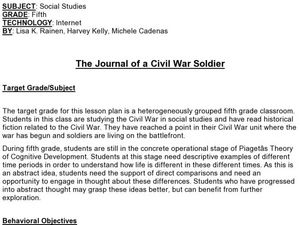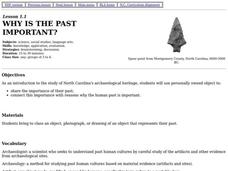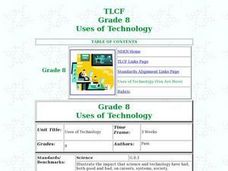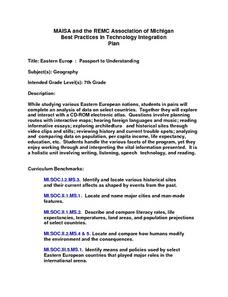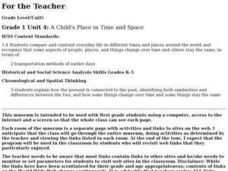Curated OER
How to Celebrate the 800th Anniversary of the Mogol Empire
Students research information on the Mongolian Empire from various readings and online videos of primary sources and create a poster for oral presentation. Students connect history with the current day, while incorporating geographical,...
Curated OER
Social Studies: Towne Planning in Tidewater
Young scholars discover how European values dominated colonial life. They also examine the effects of slavery in the Americas. Students compare the planning of their home town with that of colonial Williamsburg. They locate key sites...
Curated OER
The Journal of a Civil War Soldier
Fifth graders write a response in their journals about the fictional thoughts of a Civil War soldier. They use specific web sites in order to research the life of a soldier during the Civil War.
Curated OER
The Affect of Music on Visual Images
Eighth graders consider cross-curricular connections between social studies, singing, and current events. They listen to the song, "I Can't Cry Hard Enough." view scenes from September 11, then create presentations using images, a...
Curated OER
Slave Narratives: Constructing U.S. History Through Analyzing Primary Sources
Learners access oral histories that contain slave narratives from the Library of Congress. They describe the lives of former slaves, sample varied individual experiences and make generalizations about their research in journal entries.
Carolina K-12
African Americans in the United States Congress During Reconstruction
The Civil Rights Act of 1866, which granted citizenship to all males in the U.S., resulted in the first African Americans to be elected to Congress. Class members research 11 of these men, the challenges they faced, and craft...
Curriculum Corner
“I Can” Common Core! 3rd Grade Reading
Third grade readers are given clear learning goals with this Common Core checklist. By turning each reading standard into an I can statement, children can focus on mastering the required grade level skills.
Smithsonian Institution
Solomon G. Brown: Letter Writing
Personal correspondence in the form of letters is not as common as it once was. This resource presents an opportunity for you to introduce your class to letter writing and cover topics in social studies. Learners read a letter written in...
Stanford University
Native Californians and the Portola Expedition
What was California like before the Spanish came? Class members discover the answer to the question using images of Native Americans and diaries of the early Spanish explorers. Scaffolded activities allow instructors to adapt the...
Curated OER
Salt of the Earth: A Caddo Industry in Arkansas
Middle schoolers explore the history of the Caddo Salt Industry found in Arkansas. Along with learning about how salt deposits formed in Arkansas, learners study the process of salt production and how valuable salt is as a natural...
Curated OER
Global Warming WebQuest-Climate Scientist
In this climate science activity, students answer five multi-part questions on the responsibilities of a climate scientist. Students may gain this knowledge through a WebQuest.
New Bedford Whaling Museum
A New Bedford Voyage!
A thorough set of activities, articles, and reference material can enlighten your class about the history of whaling in New England. Kids travel back to a time when whale products were valuable and hunting whales was a way to help the...
iCivics
The Road to Civil Rights
Here is a fantastic resource on the civil rights movement! It includes reading materials and worksheets, and particularly highlights major legislation and the role of the judicial branch in the federal government in addressing the...
Education Outside
Papermaking
Imagine recycling food scraps and using them to make paper. The directions are all here in a seven-page packet that details several paper-making strategies.
NPR
The History of America’s Weed Laws
To understand the laws regarding marijuana use in the United States, you can go all the way back to the 1800's to learn about farming hemp, or you can go back to 2018 when California became the sixth state to legalize recreational...
Curated OER
Why is the Past Important?
Fourth graders discuss the importance of North Carolina's archaeological heritage. They share with the class an object, photograph, or drawing of an object that represents their own or their family's past.
Curated OER
Technology And Our Quality of Life
Eighth graders design a product or machine and determine the impact their invention has on a person's quality of life. They present their design and machine with a description of its possible impacts to an audience of peers and adults.
Curated OER
Eastern Europe: Passport to Understanding
Seventh graders explore Eastern Europe. They analyze data on select countries. Students prepare a short oral presentation on the country they researched. They locate their country using an interactive map.
Stanford University
Sedition in World War I
Students examine the critics of the First World War. In World War I instructional activity, students free write about patriotism and determine its meaning. After watching a video students discuss patriotism and opposition to the war....
Curated OER
Pottery-making Methods
Students become experimental archaeologists using three methods of pottery making before the invention of the pottery wheel.
Curated OER
A Child's Place in Time and Space
First graders visit each room of an online virtual museum in order to study transportation in the United States through time.
Stanford University
Mexicans in the United States in the 1920s
Students explore what life was like for Mexicans and Mexican-Americans in the 1920s. In this American history lesson, students watch videos and refer to multiple documents to draw conclusions as to what life was like for Mexican workers...
Curated OER
Guidelines for Teaching the Holocaust
Eighth graders view a presentation about the importance of the Holocaust. In groups, they complete a workshop in which they discover the reasons and actions behind the event. They share their feelings about the material and stereotypes...
Curated OER
The Native American Indian Women Quest
Students research background information on the role of Native American women. They then participate in a four station center which enables the students to view pictures, investigate new vocabulary, and research Native American recipies.




